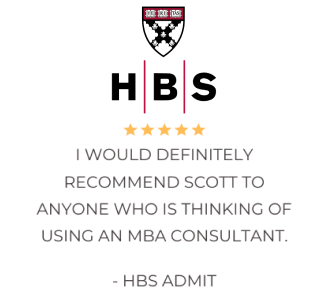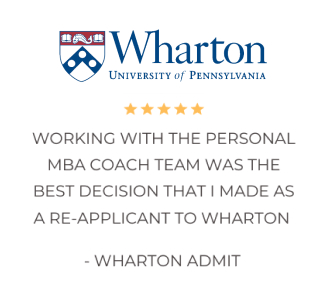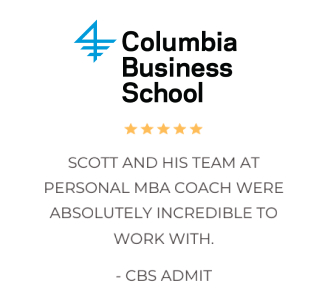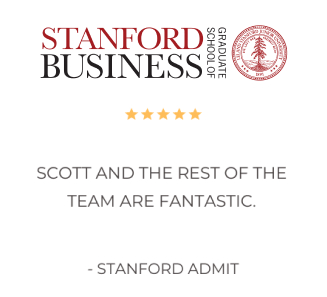FAQ
Personal MBA Coach’s average candidate applies to 5 to 8 schools, with many now in the 6+ range. Be sure that you have some “reach” schools, some “more likely” schools and some “safer” schools, especially if you want to secure an acceptance this year. All business schools look to fill their classes with diverse candidates, and you cannot always predict which school might need someone who fits your profile. Adding a broad range of schools helps to balance this. View our school guides to learn more about different MBA programs from full-time, part-time, deferred programs and more.
Building a target school list and determining which programs are right for you is a key component of Personal MBA Coach’s services.
Choosing specific programs depends heavily on your personal circumstances and goals, as well as your desired school culture, location, and areas of expertise. Personal MBA Coach regularly helps candidates select the schools they want to apply to and pick the right business school offer to accept at the end of the application process. Our consultants often consider career prospects, analyzing how likely a particular school is to help an applicant land their dream job. School selection can be a straightforward process for some or a more nuanced process depending on your situation and goals.
To find out more about developing your target school lists, please check out our Decision Making Guide.
It is never too early to get started on your MBA applications. Top MBA programs want applicants who have thoroughly researched their program, connected with alumni and current students, and set aside time to develop standout applications.
Admissions committee members want to know that you have fully thought through why you want your chosen degree, what you will do with it, and why you are interested in their particular school. Therefore, most successful applicants begin the MBA application process months before their MBA application deadlines. The best way to plan is to start even earlier. In fact, our fastest growing offering is our Early MBA Planning package where we help applicants to improve their profiles years ahead of when they will be applying to schools.
To help you make the most of your time and avoid a last-minute crunch, Personal MBA Coach has put together a 5-month MBA application timeline.
While many MBA programs have no minimum work experience requirement, on average MBA applicants have 3 to 7 years of pre-MBA experience.
For those applying to traditional full-time MBA programs, your chances of admission start to decrease slightly each year after the 7-year mark. The longer you wait, the more likely it is that you will run out of time to give your dream program your best shot. Consider taking the leap now!
However, do not worry if you have already passed 7 years of work experience, as Personal MBA Coach works with many experienced professionals who gain admission to top business schools by crafting a story to explain their roles to date.
If you have 6-10+ years of experience, an Executive MBA program might be an option to consider. Plus, for applicants in their final year of school, deferred MBA programs are also a great way to lock in a top MBA program before entering the workforce.
An MBA resume differs from a professional resume as each accomplishes a unique goal. While a professional resume shows potential employers that you have the specific skills and experiences they are looking for, a resume for an MBA application should provide evidence that you have been successful and demonstrated leadership.
In other words, rather than selling your ability to do a particular job, you are selling your future potential. Unlike professional resumes, MBA resumes do not include industry-specific terminology. Instead, they focus on learnings, results and transferable skills that show you can excel in business school and beyond. Get started today developing your MBA resume or learn more about our comprehensive consulting packages for MBA resume support.
Candidates should take whichever test they can score better on. Schools do not have a preference between the two tests. The GRE is becoming more common, and average data is becoming easier to find. Personal MBA Coach suggests taking a practice test for each to see which one comes more naturally to you. Generally, if quant is a strength the GMAT may be your best bet while those stronger in verbal tend to prefer the GRE.
Further, if you have taken one test many times and have not been successful, consider switching gears and trying the other test. Of course, you will need additional preparation for this new test, but it may be worth the effort! Learn more about our professional GMAT, GRE and Executive Assessment test preparation and tutoring services.
The EA exam was designed for experienced professionals interested in pursuing advanced education. While the EA exam is taken most often by MBA applicants applying to EMBA programs, some full-time and part-time programs also accept the EA. The 90-minute exam was created to assess the skills and knowledge of experienced professionals and evaluate business school readiness. You can take the EA exam only twice, and you cannot cancel your scores. With this in mind, be sure you adequately prepare before you take the exam.
Personal MBA Coach was the first MBA Admissions Consulting firm to offer EA tutoring. Find out more about our one-on-one Executive Assessment tutoring services.
At this time, Berkeley Haas, Chicago Booth, Columbia Business School, Duke Fuqua, INSEAD, London Business School, MIT Sloan, Kellogg, NYU Stern, UCLA Anderson, UVA Darden, Wharton and Yale SOM programs accept the EA for Executive MBA candidates. Columbia Business School, Duke Fuqua, NYU Stern, and UVA Darden are some of the top schools that accept EA scores for full-time MBA applicants. Find out more about the Executive Assessment here!
There is no “right” number of activities. This will vary from client to client and depend on the depth of your work. However, more often than not, less is more, as no one has the time to work with 10 different organizations. The best strategy is to focus your efforts on organizations or areas where you can have a real impact and add value. The most important thing to consider is how this work relates to your overall story!
Learn more about these guiding principles to keep in mind when developing your own extracurricular strategy.
For applicants hoping to secure scholarship money, it is even more important for your application to tell a solid story about how you will add unique value on campus. Whether it is your outstanding academic achievements or a new perspective you will bring to campus, developing standout applications is crucial.
Submitting your application as soon as possible will also increase your chances of earning an MBA scholarship. While some scholarships open up later in the year, there is typically a limited amount of money to go around. Keeping that in mind, the earlier you submit your applications, the better.
Finally, remember that rushed applications are rarely the strongest. Though this applies to all candidates, those looking for a scholarship should be particularly determined to strengthen their candidacy and put forth their best effort in the application process.
While MBA rankings are not the be-all-end-all, they provide a great overview of the business school landscape: what schools exist, where they are located and how they generally stack up against each other. Naturally, many prospective employers and investors will look closely at where you went to school to evaluate your skills and potential. These rankings can influence a school’s perceived education quality.
That said, rankings are not the only way you should evaluate a school. Find out more about how much emphasis you should place on business school rankings.
This is a difficult question to answer as it will vary from candidate to candidate. As a general rule, begin by comparing your score to the school’s average. Next, take an honest assessment of your uniqueness (both professionally and demographically). If you come from an overrepresented background, you should aim for a target that is ABOVE the average. However, if you have a particularly unique background or are from an underrepresented field or demographic, you may be successful even with a below-average score. Regardless of where you net out, always ensure you put your best foot forward and consider a GRE or GMAT tutor to help you prepare and reach your maximum potential.
For those who do not feel comfortable telling their employers about their MBA plans, you may be wrestling with how to handle the LOR process.
If you are unsure about whom to ask because you do not know how your boss will react, then tread carefully. You may want to have an initial conversation to explore “your development” and see where the conversation takes you. We have had clients who assumed their bosses would not be supportive only to have them actually suggest an MBA during these “development” discussions. That said, be sure to understand the politics internally so that you protect yourself and your career while doing so.
The MBA interview is an incredibly important component of the application process, and it is critical that you put in the work to prepare for this experience. In addition to practicing, you will want to research each school in detail, know your resume from top to bottom and be ready to clearly explain your goals and why you want an MBA. Get some of Personal MBA Coach’s top tips to ensure that you are ready to ace your interview.
MBA group interviews are a great way to assess how a candidate is likely to act in classroom discussions and during group meetings. Admissions committee members are looking for leaders who are able to actively contribute, but they are not interested in someone who will talk over their peers and force their opinions on others.
The Wharton TBD is the most well-known MBA group interview. Find out more about the Wharton TBD and how to prepare!





